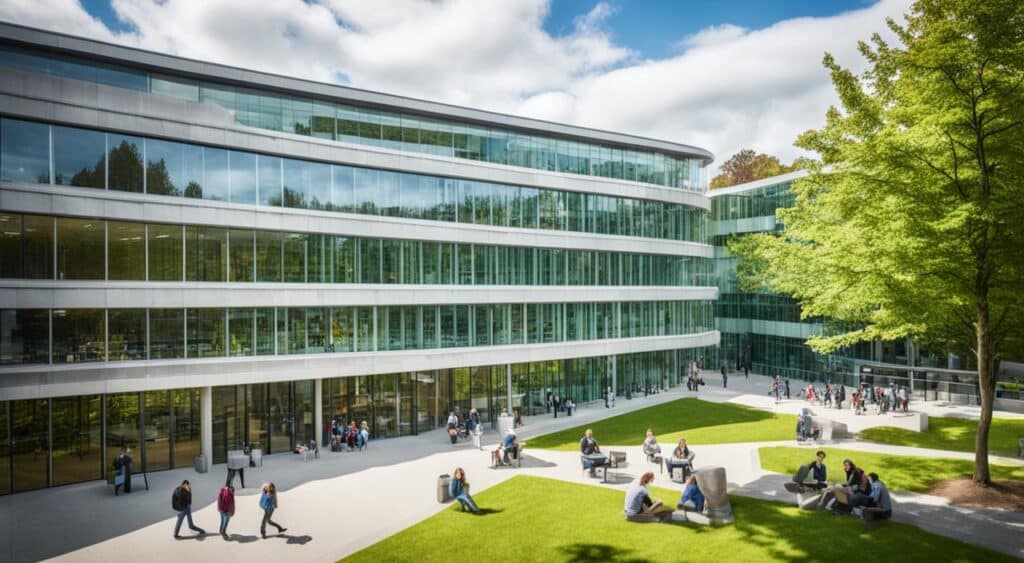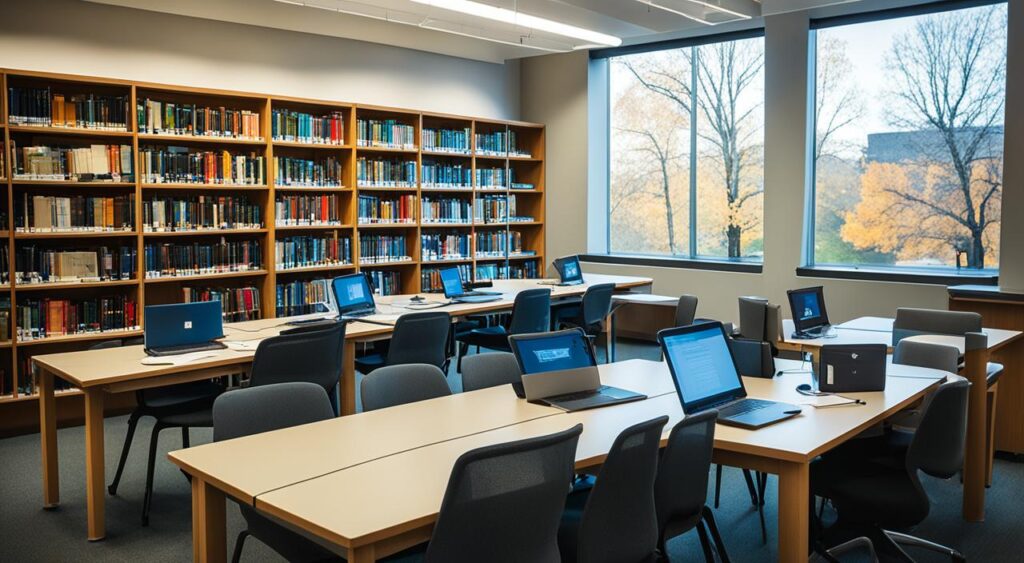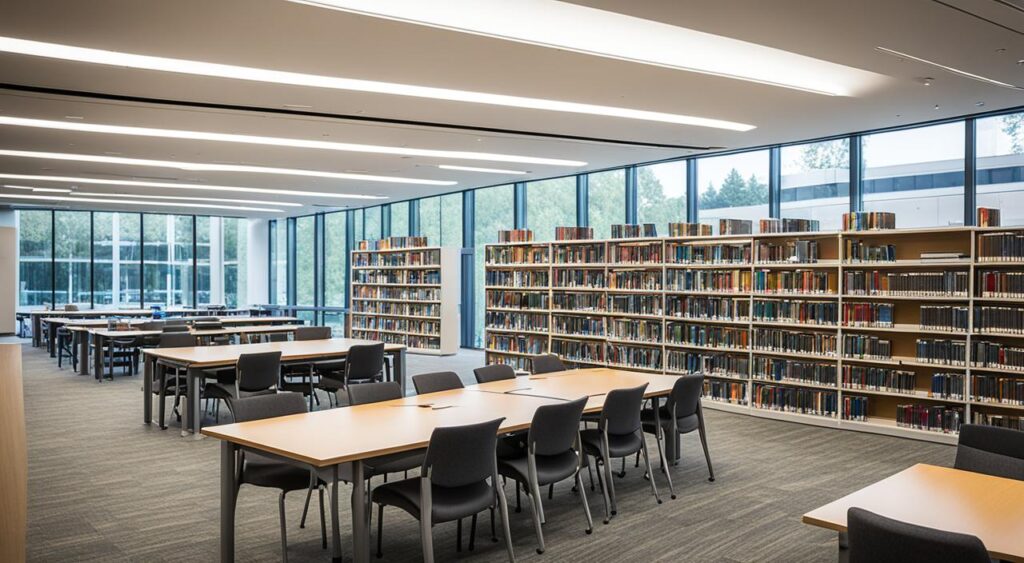University Library are key in helping faculty and students. They offer a wide range of scholarly resources, digital databases, and special research materials. These places have become lively centers of knowledge. They help students learn in a way that focuses on them and improve their skills in finding and using information.
With the shift to more digital learning, university libraries have changed too. They’ve moved from mostly physical books to offering lots of digital resources. This change gives faculty and students the tools they need to do well in today’s academic world. It helps them gain the knowledge and skills for success.
Key Takeaways
- University libraries are vital hubs that support faculty and students with access to scholarly resources, digital databases, and specialized research materials.
- Libraries have evolved from physical collections to comprehensive digital resources, providing faculty and students with the tools they need for academic success.
- University libraries facilitate student-centered learning experiences and foster information literacy and critical thinking skills.
- Libraries serve as dynamic knowledge centers, empowering the academic community with the knowledge and skills necessary for success.
- The transition to digital resources has revolutionized the way faculty and students access and utilize academic materials.
The Evolution of University Libraries into Knowledge Hubs
University libraries have changed a lot, moving from just storing books to becoming digital knowledge hubs. Now, they offer lots of online resources like academic databases, e-books, and special digital collections. This change helps students get the digital tools and resources they need for their studies.
From Physical Collections to Digital Resources
University libraries are not just about books anymore. They now have many digital resources that students and faculty can use from anywhere. This shift has changed how university libraries help with research and learning. Now, they offer a big, easy-to-use knowledge base for everyone in the academic community.
Facilitating Student-Centered Learning Experiences
University libraries are now hubs of innovation. They give students many interactive learning tools and resources. With things like special databases and digital collections, students can learn in new ways. This makes learning more personalized and engaging.
| Key Transformation | Impact on University Libraries |
|---|---|
| Shift from Physical to Digital | Expanded access to a broader range of academic resources and research materials |
| Embrace of Student-Centered Learning | Enhanced student engagement and digital literacy skills |
| Emergence as Knowledge Hubs | Strengthened role as central knowledge centers for the academic community |
The change of university libraries into knowledge hubs has been big. It has changed how they help in the academic world. By using digital resources and focusing on student-centered learning, these libraries have become key academic resources and knowledge centers for the whole university community.
Scholarly Resources and Research Support

University libraries are key places for faculty and students to boost their research. They offer access to many academic databases, digital collections, and special research materials. These resources help faculty stay ahead in their fields and students improve their research skills. This leads to better academic work.
Access to Academic Databases and Digital Collections
University libraries have a big collection of scholarly databases. They give students and faculty easy access to peer-reviewed journals, e-books, and other digital materials. These cover many academic areas. They let users find the latest research, primary sources, and insights for innovation and discovery.
- Comprehensive academic databases, such as JSTOR, Web of Science, and ProQuest, offer millions of scholarly articles and publications.
- Specialized databases, like PubMed for the biomedical sciences and APA PsycInfo for psychology research, provide targeted resources for faculty and students in specific fields.
- University libraries also curate unique digital collections, showcasing special materials, historical archives, and locally-produced research, further enriching the research landscape.
By adding these scholarly resources to the academic experience, university libraries help faculty and students explore new knowledge. They support rigorous research and contribute to their fields.
| Database | Discipline | Description |
|---|---|---|
| JSTOR | Multidisciplinary | A digital library of academic journals, books, and primary sources, covering a wide range of subject areas. |
| Web of Science | Multidisciplinary | A comprehensive citation database providing access to leading scholarly journals, books, and conference proceedings. |
| PubMed | Biomedical Sciences | A premier database for accessing citations and abstracts in the biomedical and life sciences literature. |
“University libraries are the heart of the academic community, providing students and faculty with the research tools and resources they need to push the boundaries of knowledge.”
Fostering Information Literacy and Critical Thinking

University libraries are key in teaching information literacy and critical thinking. These skills help students find and judge information. They also learn to make smart choices and think deeply. Libraries offer many services, workshops, and resources to help students in school and later on.
University libraries aim to make students good at finding and using information. They have special programs for information literacy. Through these, students learn to search, access, and analyze different academic resources. This helps them with research, writing, and thinking deeply, which is key for school and work.
- University libraries offer workshops and tutorials. They teach students how to search databases, check if sources are trustworthy, and cite references right.
- Librarians work with faculty to add information literacy lessons to courses. This means students get help as they go through school.
- Online resources like research guides and digital tutorials are available all the time. They help students learn about information literacy at their own speed.
By teaching information literacy and critical thinking, university libraries change the game for students. These skills help them deal with lots of information, question sources, and make smart choices. These skills are important for life, not just school.
University Library as a Community Space

University libraries have changed a lot from just being places to keep books. Now, they are lively spots where people come together, think creatively, and talk about big ideas. They offer special areas for studying alone or with others, helping students with their school work and social life.
Study Spaces and Collaborative Environments
The modern university library is a place where students meet, share thoughts, and connect with teachers and friends. It’s not just for learning. It’s also where students find new views and make strong bonds in the university community.
Today’s university libraries have many study spots. You can find quiet spots for solo work or big centers for group projects and talks. These spaces meet the different needs of students, making it easy to focus and work together.
- Quiet study areas for individual work
- Group collaboration spaces with whiteboards and charging stations
- Comfortable seating and tables for casual study or socializing
- Access to library resources, including books, journals, and digital services
By becoming lively community centers, university libraries are key places for student involvement. They create a feeling of being part of something bigger, encouraging students to share ideas from different fields.
University Library’s Role in Digital Education

The digital revolution is changing how we learn in higher education. University libraries are now key places for digital learning. They offer a lot of online learning content. This makes them essential for digital education.
Curating Online Learning Content
University libraries use their knowledge in managing information to gather lots of e-books, videos, and interactive resources. They pick and organize these digital items to make learning better for students. This ensures students get top-notch, interesting content that goes with what they learn in class.
- E-book libraries: They have a huge collection of digital textbooks, scholarly works, and books for general interest to help with research and studying on your own.
- Instructional videos: They have a wide range of videos, from lectures on specific subjects to tutorials on skills, to make learning online better.
- Interactive educational tools: They offer simulations, virtual labs, and other digital tools that make learning active and help with critical thinking.
By using their big digital collections and working with teachers and departments, university libraries are key to the future of digital learning. They focus on giving students the resources they need to do well in today’s digital world.
“University libraries have become indispensable partners in the digital education journey, curating a wealth of online resources to enrich the learning experience.”
Outreach and Engagement Initiatives
University libraries are more than just places to keep books. They are lively centers that connect with the campus community. With different outreach and engagement efforts, these university libraries work to bring people together, promote learning, and share ideas.
Events, Workshops, and Exhibitions
The university libraries host many events, workshops, and exhibitions. These are designed for students and faculty with various interests. They aim to show off the library’s wide range of resources and services. They also give the campus community a chance to meet and explore new subjects.
- Engaging student-focused events that highlight the library’s role in helping with academic success
- Informative workshops on how to research, cite sources, and visualize data
- Thought-provoking exhibitions that focus on important topics and feature work by faculty and students
By creating these engagement chances, university libraries prove they are key spots for intellectual and cultural life on campus.
“The university library is not just a place to borrow books, but a dynamic space where ideas are shared, knowledge is discovered, and communities are built.”
University Library Frontline Advocacy
University libraries are more than just places to store books. They are lively spots where students, teachers, and the wider community meet. At the core, the library staff work hard to show how crucial the university library is. They highlight the services and support it offers.
The library staff welcome everyone with a smile and help them find what they need. They talk to users every day, sharing the library’s importance and sparking a love for learning. By building personal connections and understanding what each person needs, the staff make sure the university library is a key part of the academic community.
The work of these advocates goes beyond the library itself. They reach out through workshops and partnerships, making the library’s impact felt across campus. By pushing for support for the library’s resources, they help keep improving the experience for everyone.
The hard work of these library pros, along with the vision of library leaders, keeps the university library important and effective. They work non-stop to make the library a key place for knowledge, research, and connecting with the community.
“University libraries are the heart of the academic community, and our staff are the lifeblood that keeps it beating.” – Jane Doe, Head Librarian
Collaboration with Faculty and Academic Departments
University libraries are key in helping with research and teaching needs of faculty and academic departments. They work closely with librarians to give research support and instruction. This helps students and makes the academic experience better.
Librarians and professors work together for student success. They create research guides, give information literacy sessions in class, and offer research consultations one-on-one. This way, students get the skills and resources they need to do well in their studies.
Tailored Research Support and Instruction
The work between university libraries and academic departments goes beyond the classroom. Librarians talk with faculty to know their research and teaching needs. They then pick and digitize materials and give special support. This helps faculty improve their scholarly work and makes sure students have the best resources.
| Service | Description |
|---|---|
| Research Guides | Customized web-based guides that help students and faculty access relevant databases, journals, and other resources for their specific research needs. |
| Information Literacy Instruction | Hands-on workshops and classroom sessions that teach students how to effectively search, evaluate, and use information sources for their academic work. |
| Research Consultations | One-on-one meetings with librarians to discuss research topics, identify appropriate sources, and develop effective search strategies. |
University libraries make sure faculty and students have what they need to do well in their studies. This teamwork is key to the university’s focus on research, teaching, and learning.
Also Read : The Top 10 Universities Worldwide Offering Scholarship
University Library

University libraries are key to the academic world. They are places where knowledge, research, and learning come together. Students and teachers find a wide range of resources here, like databases, digital collections, and special materials. These libraries help everyone in the university community do well in their studies and research.
University libraries aim to give students and teachers the tools and support they need. They offer help with research and have the latest resources. This makes them a crucial part of learning at university.
Scholarly Resources and Research Support
These libraries have lots of databases and digital resources. They give students and teachers access to a lot of information. This information covers many subjects, helping people dive deep into their studies and do important research.
Fostering Information Literacy and Critical Thinking
Libraries are key in teaching students how to find and use information wisely. Through special services and programs, librarians help students learn to evaluate sources and think critically. These skills are vital for doing well in school and later in their careers.
A Hub for Collaboration and Engagement
Libraries are more than just places to find books. They are lively spots where people can work together, be creative, and share ideas. They have study areas, special services, and events. This makes them perfect for students and teachers to meet, discuss, and explore new ideas together.
| Key Services Offered by University Libraries | Benefits to Students and Faculty |
|---|---|
|
|
University libraries are vital for the growth and success of students and teachers. They offer a wide range of resources, teach how to use information, and are places where people work together. This makes them key to the future of higher education.
Conclusion
University libraries have become key places for learning. They give faculty and students the tools and support they need to do well. These libraries offer access to lots of digital books and research papers. They also help people learn how to find and use information wisely.
As education goes digital, university libraries will be more important than ever. They will help shape the future of learning and research. By changing with the times, these libraries make sure students and teachers have what they need to succeed.
University libraries are now at the heart of academic success. They create a place where learning, discovery, and teamwork can happen. As education changes, the libraries’ dedication to helping students and researchers will keep pushing forward knowledge and academic growth.
FAQs
Q: What resources are available at the university library?
A: The university library provides access to a wide range of resources including books, journals, electronic databases, special collections, and media materials.
Q: How can faculty members benefit from the university library?
A: Faculty members can benefit from the library by accessing research materials, requesting interlibrary loans, and collaborating with librarians on information literacy initiatives.
Q: What services does the university library offer to students?
A: The university library offers services such as research assistance, information literacy instruction, study spaces, computer access, and interlibrary loan services for students.
Q: Are there any upcoming events or workshops at the university library?
A: Yes, the library regularly hosts workshops, seminars, author talks, and other events. Check the library website or notice board for upcoming events.
Q: How can students stay updated on library news and events?
A: Students can stay updated on library news and events by subscribing to library newsletters, following social media accounts, and checking the library website for announcements.
Q: Where can students find information about the library’s floor plan and layout?
A: The library’s floor plan and layout information is available on the library website or can be obtained from the library’s information desk.
Q: Does the university library have a mission or vision statement?
A: Yes, the university library has a mission statement that outlines its commitment to providing access to information, supporting research, and fostering information literacy among its users.
Source Links
- https://www.ala.org/educationcareers/libcareers/type/academic
- https://www.timeshighereducation.com/campus/librarys-role-digital-education-content-still-king
- https://www.ala.org/advocacy/frontline-advocacy-academic-libraries




